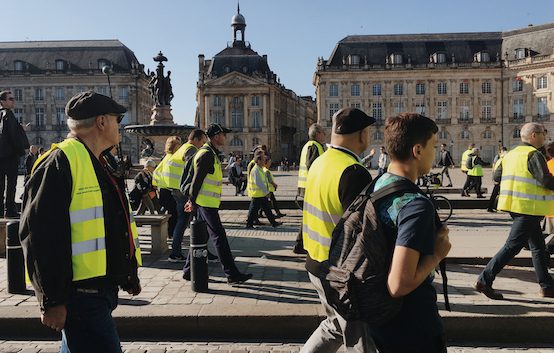The Bright Yellow Line Over Globalization in France

The mass protests of the “gilets jaunes” (yellow vests), named for the high visibility garments French motorists are required to carry for emergencies, may have a short-term impact on France’s politics. They could further diminish French President Emmanuel Macron’s already low approval ratings, and perhaps put some pressures on his legislative majority. Or they may fizzle amidst heavy mainstream media contempt. But their importance shouldn’t be doubted, as they reflect an important sociological dynamic, one with echoes throughout the West.
Last Saturday, roughly 300,000 vest-wearing protesters blocked roads and tried to disrupt normal activity throughout France. They were protesting a proposed rise in gasoline taxes and plan to continue this weekend and the next. Raising carbon taxes might make sense if you want to raise revenues and mitigate climate change, but it’s going to fall most heavily on those with tight budgets who depend on their cars to get to work every day. That sets up a stark confrontation between what the French sociologist Christophe Guilluy calls “la France périphérique” and those major cities that have grown more prosperous even as the working and middle classes have declined.
Guilluy has built his arguments around the growing divide between the winners of globalization—Paris, Lyon, Bordeaux, and other major cities, which host industries able to produce for the global market—and the French periphery, smaller cities and rural areas that are failing to keep up. The major cities are home to France’s major corporations, banks, and culture organizations. Demographic changes in and around those cities have intensified the divide. Low-paying service jobs—minding the children, cleaning up at restaurants, trimming the hedges of the new bourgeoisie—are increasingly held by immigrants.
The white working class, which used to inhabit the Paris suburbs, what was once called the Red Belt, has shrunk in numbers as French manufacturing has declined. Formerly white working-class suburbs, like the towns of Seine-St.-Denis, are now largely populated by immigrants and increasingly dominated by Islamist Muslims. The public housing built in the decades after World War II to house a growing working class has seen a massive flight of native French people. In today’s Paris suburbs, riots and “car b q’s” erupt with some regularity and low-grade ethnic tension is a constant. In one of Guilluy’s previous works, he describes the “battle of eyes” that takes place in the lobbies and elevators of French housing projects. If a white native French person moves into public housing, he finds himself perceived as having intruding on a Muslim space. The battle is over who—the Frenchman or the immigrant’s son—will drop his gaze first.
Not surprisingly, few French people want to live this way, however abstractly they might be committed to coexisting in a multicultural society. So increasing numbers of working- and lower-middle-class white Frenchmen have evacuated the suburbs, usually for exurban areas. Meanwhile France’s urban-dwelling, knowledge-based bourgeoisie benefits from what Christopher Caldwell caustically describes as “taxpayer subsidized servant’s quarters”—the public housing close to Paris, with its heavily funded and quite efficient public transportation networks.
Over the past 20 years, the French central government, spooked by riots and terrorism, has moved piles of money into these immigrant suburbs, seeking to ensure that new immigrants will become normally assimilated into French life. Such efforts have not been particularly successful. (A new book on Seine-St.-Denis called Inch’allah, directed by two veteran reporters for Le Monde, chronicling the Islamization of Paris’s close-in northern suburbs, illustrates the failure of successive governments to bridge the moral and cultural gaps between immigrants and Frenchmen. I will write about this book, and its reception, in a future post.) But the immigrants do at least have housing near jobs and transportation networks, while the whites who have left Seine-St.-Denis and other suburbs do not.
So now progressive France plays the environmentalist card on those who have been pushed out. Why are they still driving around in their stupid diesel-guzzling automobiles? What was not long ago the world’s most politically conscious and economically protected working class has been whittled away, to the point where it is hardly considered a necessary part of any left-of-center political coalition. Meanwhile French cities built around manufacturing and agriculture are hollow shadows of what they were a generation ago, redolent of towns in America’s Rust Belt.
This is the structural underpinning of the gilet jaune protest. One can think of it as a protest of Frenchmen (and women) who have lost first their geographic proximity to the most dynamic sectors of the French economy and then their essential place on the left. Unlike the young black and Muslim rioters of Seine-St.-Denis, they have no cheering sections in the progressive media. Their protests are broadly supported for the moment (Macron’s new taxes, designed, it would seem, to fall disproportionately on the working and middle classes, are very unpopular).
The protesters are heirs to a political tradition that cherishes rebellion, and they have genuine economic grievances. Indeed the movement’s very sudden rapid emergence is indicative of the desperation of people who feel they can’t make it anymore. Yet they’re sneered at by the government and most of the elite media. It seems all too possible that this weekend or the next, a road blockage by the gilet jaunes will result in a tragic and unnecessary death, costing the movement much of the political support it now has.
It’s not especially clear how France will emerge from this dilemma, which is largely self-created.
Scott McConnell is a founding editor of The American Conservative and the author of Ex-Neocon: Dispatches From the Post-9/11 Ideological Wars.
Comments